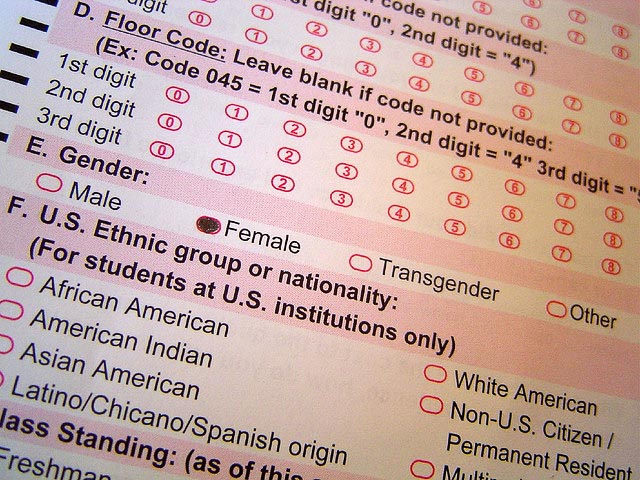Starting in 2000, the U.S. Census made a groundbreaking change. For the first time, respondents had the option of identifying themselves with more than one race.
The move was a response to the growing reality that our country is increasingly diverse. Asking someone to address race with a single check mark didn't capture the complexity of the topic.
Americans responded in full force to the change. In 2000, more than 6.8 million people - 2.4 percent of the population - identified themselves as members of at least two races. A decade later, the figures were up even higher. Nine million people, or 2.9 percent of the population, called themselves multi-racial in 2010.
If the Census could evolve on the issue of race, could it evolve on the issues of sex and gender as well?
That's the question a pair of researchers wondered. More specifically, they wanted to know if people who identify as transgender - having a gender identity different form their sex at birth --- would want to have the option of calling themselves transgender on the Census. As it stands today, Census respondents are simply asked if they are male or female.
The transgender community has become increasingly visible in recent months, which is brought increased attention to the issue. Olympian Caitlyn Jenner will grace the cover of Vanity Fairto announce her transition to being a woman. Earlier this year, transgender actress Laverne Cox was named one of TIME magazine's 100 most influential people. And the television series Transparent, which features a transgender character, recently won a Golden Globe award.
Adding a transgender option could help legitimize the transgender population, advocates have argued. And importantly, it could help give policymakers a more accurate estimate of the size of the transgender population.
Including another option besides male and female on the form wouldn't be without precedent.
In 2011, India added an option for a third "other" category to the gender question on its Census, and about 490,000 people selected it. Nepal also recognized a third gender on its census forms. New Zealanders can declare themselves to be male, female or "X" on their passports.
But the U.S. has been reticent to address the topic. A petition on the Obama administration's "We the People" site asked the federal government to recognize genders besides male and female. An Obama administration official responded by saying such decisions would best be made on a case-by-cases basis.
In an email to the Urban Edge, a Census spokesperson said there are no plans to test a transgender option on the 2020 survey. But, she added the Census Bureau is part of an federal interagency group working to improve measurements of the LGBT community in surveys.
Meanwhile, research data shows even if there was a transgender option on the Census, it may only me used by a small segment of the transgender population. Those were the conclusions published earlier this year in the journal Transgender Studies Quarterly by Jenifer Bratter, director of the Program for the Study of Ethnicity, Race and Culture at the Kinder Institute for Urban Research, and Kristen Schilt, of University of Chicago.
Bratter said she expected people in the transgender community to widely indicate they'd want to check off a "transgender" box on the Census, but that didn't turn out to be the case.
The researchers' findings were based on surveys the distributed at conferences in Seattle, Los Angeles and Philadelphia geared towards the transgender population.
They analyzed 134 responses and found about 41 percent of respondents endorsed a transgender option on the Census. Only about a quarter of respondents, however, said they identify themselves as transgender on forms when they have that option. More than 70 percent of them reported their gender simply as male or female.
Bratter said that's because some people who identify with a gender that's different form their sex at birth don't necessarily identify as "transgender".
People who identified as male or female and who felt others viewed them as unequivocally male or female - even when that wasn't their sex at birth -- were less likely to have an interest in checking off the "transgender" option. A transgender option is most attractive to those who feel outsiders do not see them as they see themselves..
Bratter said part of the disparity may be because of the way sex is tracked in this country. An individual's race isn't tied to his Social Security card or a birth certificate and is largely unregulated territory. That gives Census respondents the freedom to feel they can answer the race question any way they want. Because sex is recorded on birth certificates and tied to Social Security numbers, shifting responses raises both administrative and legal questions..
Social pressure might also be an obstacle too. Generally, people feel more pressure about the norms surrounding their gender than those surrounding their race, Bratter said.
"You have examples of mixed-race celebrities, and there's an understanding that it's a viable identity," Bratter said. "You certainly don't yet have that institutionalized embracing of being transgender yet. It's a newer conversation."
The results suggest that even if the Census did include a transgender question, the size of the transgender population would likely be underestimated.
Still, having a transgender option on the Census could be useful for policymakers, since it would allow them to track - at least to a degree - the size of a particularly vulnerable population, Bratter said.
"Transgender individuals experience discrimination," Bratter said. "Community organizations that aim to serve these group really need hard numbers to justify what they're doing."

